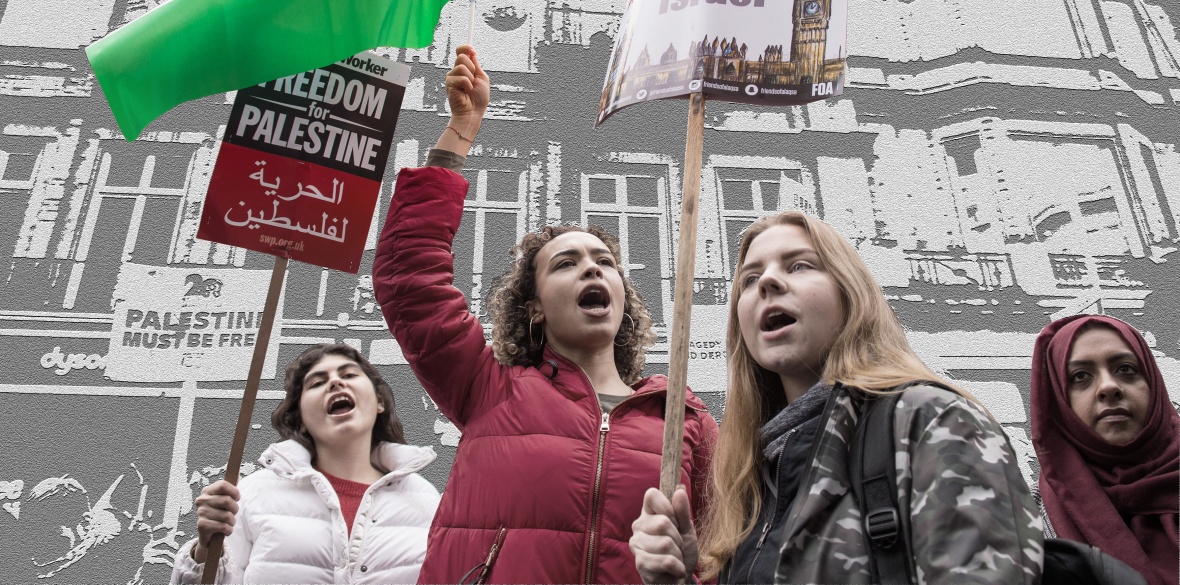This is the last article you can read this month
You can read more article this month
You can read more articles this month
Sorry your limit is up for this month
Reset on:
Please help support the Morning Star by subscribing here
ON JULY 1 the Israeli government announced a temporary postponement of its plans to proceed with the annexation of swathes of Palestinian territory in the West Bank, needing more time to finesse the finer details with the Trump administration.
The day before, the Sumarin family of Silwan in East Jerusalem gathered in an Israeli court in a last-ditch endeavour to prevent the decades-long attempt to evict them from their family home.
They were unsuccessful. Now, they face forcible removal from the home they have lived in for decades.
The law being used to evict them is the Absentees Property Law, passed in 1950 as a mechanism to legitimise the theft of land from Palestinians who had fled or were expelled during the Nakba, thereby permanently dispossessing them.
The law was applicable to more than 85 per cent of the land. Today, 93 per cent of the land in Israel is now owned by the state and controlled by the Israel Land Administration.
Under Israeli law, it makes the land available and accessible to the Jewish people exclusively, denying access to Palestinian citizens of the state.
The Sumarin family story is relevant to our understanding of Israel’s proposed annexation of up to 30 per cent of the West Bank.
First, if the looming annexation follows the model of Israel’s existing annexation of East Jerusalem, then Palestinians affected would be offered residency rights.
This brings them under the rubric of Israeli civil rather than military law but without full citizenship rights.
The majority of Palestinians in East Jerusalem, like the Sumarin family, aren’t Israeli citizens.
Instead, they are second-class permanent residents, who can’t participate in national elections, and must constantly prove Jerusalem is still their “centre of life” when coming into contact with occupying Israeli authorities or risk deportation.
They face a raft of discriminatory policies, including eviction and home demolition to drive them out of the city, while illegal Jewish-only settlements are given political and financial support.
But of course if annexation does not proceed, then Palestinians living in the West Bank, although not subject to Israeli civil law, will still be living under a matrix of control established by an illegal military occupation.
Now in its 53rd year, this deprives them of their basic rights of freedom of movement, of access to their land, water and other resources and Israel’s colonising project would continue though increased settlement expansion.
As one recent article noted, “If you ask Palestinians in the Jordan Valley how they feel about annexation, many will tell you that they thought we had already been annexed long ago.”
This reality explains why some Palestinians are resisting the framing of annexation as a “Rubicon moment” requiring, for the first time, a sanctions-led response.
This risks normalising a status quo of continued de facto rights deprivations already in place and already deserving of sanctions.
However, annexation matters because it removes the illusion which has created the rationale for passivity on the part of the international community for decades: that Israel is a liberal democracy overseeing a temporary occupation pending negotiations which will lead to the establishment of a viable Palestinian state.
Although it has been clear to some that Israel’s intention has always been to establish a greater Israel, encompassing maximum land and minimum Palestinians, annexation will make it impossible to sustain the conjuror’s distraction trick provided by the Oslo process.
In this regard, annexation is then very much a Rubicon moment. Denied the continuing option of pretending that there is a viable peace process founded upon the willingness of the Israeli political mainstream to respect international law and core Palestinian rights, the question becomes stark.
Will the international community tolerate apartheid when the stench of it is waved directly beneath its nose?
This is not to say that annexation creates apartheid but rather that it makes it undeniable.
Apartheid applies as a legitimate description of the regime of control Israel exerts over Palestinians in the West Bank and Gaza.
A regime that functions through the mechanism of military occupation over Palestinian citizens of the state via a body of laws.
This includes the pernicious nation-state law that renders their citizenship second class and over Palestinians like the Sumarin family living in annexed East Jerusalem.
As Raef Zreik says of the Israeli nation-state law and of annexation, the two are “not two separate plans, but two plans that feed on the same rationale, [which] is that between the river and the sea, there are two groups of people and there is a superiority of the Jewish people over the Palestinian people.”
So this is entirely the right moment to assert the reality that has been apparent for many years, that unless the world acts by imposing meaningful consequences though targeted sanctions, Israel will believe it is free to continue its project of colonising all of the land between the river and the sea and establishing an apartheid system of rule.
This is why the language of sanctions, delegitimised for decades in relation to Israel, is now echoing in the corridors of Westminster.
This is why the framing of apartheid, which for years Israel and its supporters have attempted to disrupt via accusations of anti-semitic intent, is finally entering the mainstream of political discourse.
And that is why the Palestine Solidarity Campaign will tomorrow be leading a day of action across Britain to demonstrate against annexation, and against the continuation of apartheid.
Our message is clear :#StopAnnexation #EndApartheid #SanctionsNow.
Ben Jamal is director of the Palestine Solidarity Campaign. The solidarity day of action takes place on Saturday July 4. To find out more visit www.palestinecampaign.org.









